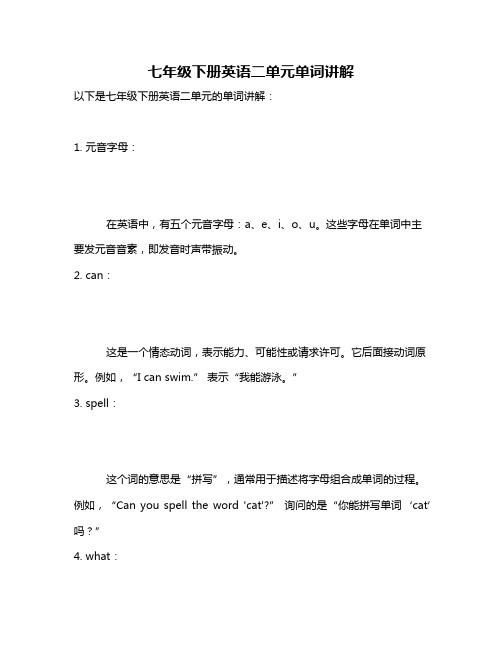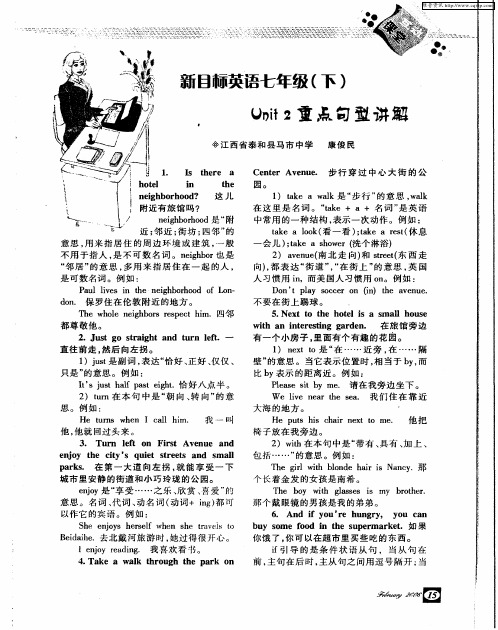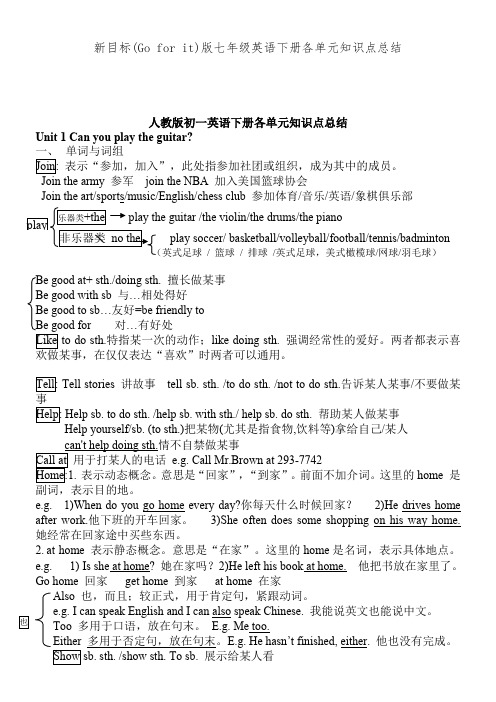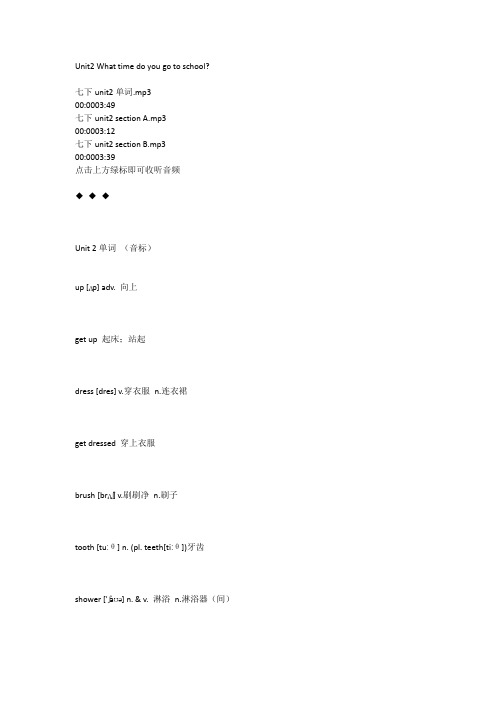新目标七年级英语下各单元重点单词讲解2
人教新目标英语七年级下册Unit2--3单词句型讲解词汇课件

词汇点睛
lot pron. 大量;许多
lots of = a lot of 大量的;许多的 +n
a lot (adv.) 修饰动词或句子 很;比较
【联想与总结】
many 许多的 +可数名词复数形式 much大量的 +不可数名词 some一些 +可数名词复数形式/不可数名词
Period 2
get up v. 起床
词汇点睛
【原文】What time do you usually get up?
【拓展】get 得到;拿;取;理解----getting(动名词) get up 起床 get to到达 get home到家 get on上车 get off 下车 get dressed穿衣
词汇点睛
brush v. 刷; n.刷子
tooth n.牙----teeth(pl.)
【例句】I brush my teeth after getting up. 【拓展】brush---brushes(动词三单形式;名词复数形式)
brush one’s teeth There are two brushes under the chair. Mary gets up at 7:00 and brushes her teeth at 7:15.
Period 1
o’clock n …点钟
词汇点睛
【例句】Most of students get up at seven o’clock these days.
【拓展】
时间---几点几分的表达用词及用法1
整点---(1)整时数(钟点数)+o’clock (单数)
人教版(新目标)初中英语七年级下册Unit 2预习自学

Unit 2单词(音标)up [ ʌp] adv. 向上get up 起床;站起dress [ dres] v. 穿衣服 n. 连衣裙getdressed 穿上衣服brush [ brʌʃ] v. 刷刷净 n. 刷子tooth [ tuːθ] n. ( pl. teeth[ tiːθ]) 牙齿shower [ ' ʃaʊə]n.& v.淋浴n. 淋浴器(间)take a shower 洗淋浴usually [ ' ju: ʒuəli] adv. 通常地;一般地forty [ ' fɔ:( r) ti] num. 四十wow [ waʊ] interj.(表示惊奇或敬佩)哇;呀never [ ' nevə( r)] adv. 从不;绝不early [ ' ɜːlɪ]adv.& adj. 早(的)f i fty [ ' f ɪ ftɪ]num. 五十job [ dʒɒb], [ dʒɑːb] n. 工作;职业work [ wɜːk] v. & n. 工作station [ ' steɪʃn] n. 电( 视) 台;车站radio station 广播电台o' clock [ ə' klɒk], [ ə' klɑ: k] adv.(表示整点)…… 点钟night [ naɪt] n. 晚上;夜晚funny [ ' fʌnɪ] adj. 奇怪的;滑稽好笑的exercise [ ' eksəsaɪz]v.& n. 锻炼;练习on weekends ( 在) 周末best [ best] adj. 最好的 adv. 最好地;最group [ gruːp] n. 组;群half [ hɑːf], [ hæf] n. & pron. 一半;半数past [ pɑːst],[ pæst]prep. 晚于;过(时间) adj. 过去的quarter [ ' kwɔː( r) tə( r)]n. 一刻钟;四分之一homework[' həʊmwɜː( r) k] n. 家庭作业do( one’ s) homework 做作业run [ rʌn] v. 跑;奔clean [ kliːn]v. 打扫;弄干净 adj. 干净的walk [ wɔːk]n.& v. 行走;步行take a walk 散步;走一走quickly [ ' kwɪkli] adv. 很快地either [ ' aɪðə( r)], [ ' iː ðə( r) ] adv. 或者;也(用在否定词组后)either… or…要么……要么……;或者……或者……lot [ lɒt], [ lɑ: t] pron. 大量;许多lots of 大量;许多sometimes [ ' sʌmtaɪmz] adv. 有时taste [ teɪst]v. 有……的味道;品尝 n. 味道;滋味li fe [ laɪf]n. 生活;生命Rick [ rɪk] 里克(男名)Jim [ dʒɪm] 吉姆(男名)Scott [ skɒt], [ skɑ: t] 斯科特(男名)Tony [ ' təʊnɪ] 托尼(男名)unit2电子课本Liaten and match the timea with the actions. Draw lines from the clocksto the pictures.Snident A ie the interviewer. Student B is Rick. Ask amd axxswerquestions about Rick's day.A: V 'ha c t tim dci yo u usually take a s lioive r, Rick * B : 1 us my take a sh never aI s ix fo rty.Match theactivi£ics wiEts tJze pictures.1. ,lot up c?. gn tn sChnnlri t si x i hi r r yWhos tiry›c dg ypuusmlly get up7Jim hassisters. Jim’s familyhas _ xhuxvcr.Ltccers agaJxs. Cossp!ete tbe shower schedcsle £orJiza*c fiuoJ3y'.Tims5:3¢linterviewer: -$cott has an inrcrext ing jrib. He wcirks at a radiri station.Scott, what time is your radio show?Ston: Interviewer: Scott:From bvelve o’clock at night to six oklock in the morning. What time do you usually get up?At eight thirty at night. ”thenI eat breakfast at nine.Interviewer: ‘Heat s a ftnftf¥y titTte fOr t›renkfast!S‹ort:Scoti:Yeah. After that, I usually exercise at a1›nut ten twenty. then do you go to «'ork?At 4•levcn t3’clock, .*cl I 'mnever late for work.tøte on •<cłændsüh< țjr î3 uc u14.Anna never eats breakfast.S. What rime does your be3t Friend go to sckooł7When do students usually do these things? h4atchthe activitie.s tenth the time of day..i .jiiartcr i‹› ten ii* ila.Check your answers with your partner.sListen rind circle the activities yuu hear.g= =p 5: 30.1. eat \ realm:1st 4. ¿u tu choul. in hnmc7. clcan i riy rel t3It1G. eat ‹4in n er9. t.Ake a is' all 1 O. t;ci ter b c dListen agatn. Wrtte Mtc titres text to tbe actioicies yotz circled In 1 c.AkandanswerquesConsaboutlom. ’Unit2 知识梳理◆短语归纳1.what time 几点2.go to school 去上学3.get up 起床4.take a shower 洗淋浴5.brush teeth 刷牙6.get to 到达7.do homework 做家庭作业8.go to work 去上班9.go home 回家10.eat breakfast 吃早饭11.get dressed 穿上衣服12.get home 到家13.either…or…要么…要么…14.go to bed 上床睡觉15.in the morning/afternoon/evening 在上午/下午/晚上16.take a walk 散步17.lots of=a lot of 许多,大量18.radio station 广播电台19.at night 在晚上20.be late for=arrive late for 迟到◆用法集萃1.at + 具体时间点在几点(几分)2.eat breakfast/lunch/dinner 吃早饭/午饭/晚饭3.thirty/half past +基数词…点半4.fifteen/a quarter to +基数词差一刻到…点5.take a/an+名词从事…活动6.from…to…从…到…7.need to do sth 需要做某事◆典句必背1.—What time do you usually get up? 你通常几点钟起床?—I usually get up at six thirty. 我通常6:30起床。
七年级下册英语二单元单词讲解

七年级下册英语二单元单词讲解以下是七年级下册英语二单元的单词讲解:1. 元音字母:在英语中,有五个元音字母:a、e、i、o、u。
这些字母在单词中主要发元音音素,即发音时声带振动。
2. can:这是一个情态动词,表示能力、可能性或请求许可。
它后面接动词原形。
例如,“I can swim.” 表示“我能游泳。
”3. spell:这个词的意思是“拼写”,通常用于描述将字母组合成单词的过程。
例如,“Can you spell the word 'cat'?” 询问的是“你能拼写单词‘cat’吗?”4. what:这个词通常用于提问,询问某事物是什么或怎么样。
例如,“What is your name?” 询问的是“你的名字是什么?”5. is:这是一个系动词,用于连接主语和表语。
它表示某事物是怎样的状态。
例如,“She is a student.” 表示“她是一名学生。
”6. your:这是一个形容词性物主代词,用于指代别人的事物。
例如,“Is this your book?” 询问的是“这是你的书吗?”7. name:这个词的意思是“名字”,通常用于指代某人的标识符。
例如,“My name is Alice.” 表示“我叫Alice。
”8. please:这是一个感叹词,用于表示礼貌或请求。
在句子中通常用于请求或提供信息之前,例如,“Please come in.” 表示“请进。
”9. in:这个词通常用于描述位置或状态,表示某事物在某个地方或处于某种状态。
例如,“The book is in the bag.” 表示“书在包里。
”10. class:这个词的意思是“班级”,通常用于描述一组学生或一组人员。
例如,“I am in class 3.” 表示“我在3班。
”11. grade:这个词的意思是“年级”,通常用于描述学生在学校中的年级或层次。
例如,“I am in Grade 7.” 表示“我在七年级。
新目标英语七年级(下)Unit2重点句型讲解

d n 保 罗住 在伦 敦 附近 的地 方 。 o.
T e wh l eg b r e p c i h oe n ih os r s e t hm.四 邻
会儿 )tk h w r( 个 淋浴) ; e a so e 洗 a 2 ae u ( 北 走 向) s et东 西 走 ) vn e南 和 t e( r 向) 都 表 达 “ 道 ” “ 街 上 ” 意 思 , 国 , 街 ,在 的 英 人 习惯 用 i,而美 国人习惯 用 o 。例 如 : n n D n tpa o cro ( )te a e u . o ’ ly sce n i h vn e n 不 要在 街上 踢球 。
鳓 一回
维普资讯
一
熹囊薹雾 薰薰 雾墓蓥 雾墓墓慧 薹雾 雾囊嚣 雾冀雾篓 暮 嚣
{
主 在 ,句 后 不 任 标 符 。 5T ri o … 一f-r rn 句 前从 在 则 加 何 点 号 .hes z … … 。t i t e o a e v a } e l
H ushs c a e tt e e p t i hi n x o m . 他 把 r 椅 子放在 我旁 边 。 2 i )wt 本 句 中是 “ h在 带有 、 具有 、 上 、 加 包括 … … ” 的意思 。例 如 :
T e gr w t ln e h i i n y h il i bo d ar s Na c .那 h
那个 戴 眼镜 的男 孩是 我的弟 弟 。
6 And f y . i ou’ e ung y y u c n r h r. o a
以作 它 的宾语 。例 如 : S e ejy esl w e h ry i t h nos h r f h n s e t s o e ae B ia e edi .去 北戴 河旅 游 时 , h 她过得 很 开心 。 1ejy ra i . 我 喜欢 看 no edn g 牿。
新目标(人教)七年级下册英语单元复习课件 Unit 2复习课件

具体时刻,也可询问日期、月份、年份等。 ②when常用来提问年、月、日、上/下午等大概时间,此时
when不可与what time替换。
From twelve o'clock at night to six o'clock in the morning.从夜里十二点到早上六点。
on weekends
radio show
16.几点 ____w_h__a_t_t_i_m__e_______
1178..一半份小有时趣__的__工___作____a__n____i__n__t__e__r__e___s__ti_n_g__j_o_b__ 19.要么……要h么al…f …an;h或ou者r……或者…… ____________________ 20.做作业 _________________________
either...or...
do (one’s) homework
21.去睡觉 __g_o__t_o__b__e_d_________ 2223..到散家 步;__走g__e一_t__走h_o__m_____e_________________________ 24.快速地吃 _________ta__k_e__a__w_a__lk_ 25.做运动 ____________________
play computer games
go home
三、核心句型
1. 里克,你通常几点钟洗淋浴?
__W__h_a_t_ _t_im__e___ do you usually _t_a_k_e__ __a_ _s_h_o_w__e_r,Rick? 2. 我通常在六点半起床。 I _______ ____ _____ at six thirty. 3.u—su—a斯lly科g特et,u你p的广播节目在几点?——从夜里12点到早上6点。 —Scott,________ ________ is your radio show? —_______ wtwhealvte o'cltoimckeat night _______ six o'clock in the morning.
新目标(Go for it)版七年级英语下册各单元知识点总结

新目标(Go for it)版七年级英语下册各单元知识点总结人教版初一英语下册各单元知识点总结Unit 1 Can you play the guitar?一、 单词与词组表示“参加,加入”,此处指参加社团或组织,成为其中的成员。
Join the army 参军 join the NBA 加入美国篮球协会Join the art/sports/music/English/chess club 参加体育/音乐/英语/象棋俱乐部play soccer/ basketball/volleyball/football/tennis/badminton / 篮球 / 排球 /英式足球,美式橄榄球/网球/羽毛球)Be good at+ sth./doing sth. 擅长做某事Be good with sb 与…相处得好Be good to sb …友好=be friendly toBe good for 对…有好处特指某一次的动作;like doing sth. 强调经常性的爱好。
两者都表示喜讲故事 tell sb. sth. /to do sth. /not to do sth.告诉某人某事/不要做某帮助某人做某事Help yourself/sb. (to sth.)把某物(尤其是指食物,饮料等)拿给自己/某人e.g. Call Mr.Brown at 293-7742意思是“回家”,“到家”。
前面不加介词。
这里的home 是e.g. 1)When do you go home every day?你每天什么时候回家? 2)He drives home after work.他下班的开车回家。
3)She often does some shopping on his way home. 她经常在回家途中买些东西。
2. at home 表示静态概念。
意思是“在家”。
这里的home 是名词,表示具体地点。
2020年人教新目标版初中英语七年级下册第二单元讲义重点短语语法归纳及练习

UNIT2 讲义第一部分 【重点短语】What time go to school get up take a shower brush one’s teeth get to do one’s homework go to work go home eat breakfast穿上衣服 上床睡觉要么……要么 take a walk大量;许多 radio station Bus station at night迟到 on weekends eat quickly play sports玩电子游戏 be good for Half past six it tastes good From to a quarter to six第二部分 【重点语法】一.what time 与what 引导的特殊疑问句What time询问某事发生的具体时间点what均可询问做某事的具体时间询问某事发生的年份,月份,日期例句:1.What time do you get up?=When do you get up?I get up at 6:30/2.What time is it now?“现在多少点钟?”It’s 8:00.3.When is your birthday?It’s on March 3rd .二.频度副词(表示做某事重复的次数)1.AlwaysUsually Often Sometimes Hardly ever never 总是通常经常有时几乎从不决不,从不1.频度副词的位置(简单归纳:be/助/情之后,实义动词之前)例句:She is always busy.(be 动词之后)I will always like you.(助动词之后)I can always get up early.(情态动词之后)We often play chess after school.(实义动词之前)2.对频度副词提问,用how often.“多久一次”-How often do you exercise? 你多久锻炼一次?-I never do exercise. 我从不。
人教新目标七年级英语下册课堂笔记Unit 2 What time do you go to

Unit 2 What time do you go to school?2012版人教新目标七年级英语下册课堂笔记1. upadv. 向上n 反义词:down nget up起床nstand up起立Please lift your head up.2. dress v. 穿衣服n. 连衣裙n复数:dressesn get dressed穿上衣服My daughter is too young to dress herself.3. brush v. 刷;刷净n. 刷子n 复数:brushes n 单三: brushes nwipe擦nsweep扫nrub摩擦nscrape刮掉You have to brush your shoes now.4. toothn. 牙齿n 复:teeth nbrush teeth刷牙ntoothpick牙签ntoothpaste牙膏ntoothbrush牙刷The baby has two teeth.常见的可数名词单数变复数时不规则变化的名词有: man, woman, child, foot, mouse, tooth 等。
我们可以用这样一句话来记忆这些单词“男女孩子的脚踩住老鼠的牙”5. shower n. & v. 淋浴,(名)淋浴器n 近: bath 洗澡,沐浴ntake/have a shower洗澡nshower下阵雨,倾注;阵雨,大量倾泻nshow给……看You’d better take a shower.6. usually adv. 通常地,一般地Do you usually go to the park?n unusually异乎寻常地7. fortynum. 四十n 表示“几十”的数字都以-ty结尾。
n词形特殊的有:twenty, thirty, forty, fifty, eighty.nfour四nfourteen十四There are 40 students in Class One.8. never adv. 从不; 绝不n Better late than never.迟做总比不做好。
初中英语人教新目标七年级下册Unit 2 单元知识点

七年级英语下册Unit 2知识点【Useful expressions】1.what time 几点2.go to school 去上学3.get up 起床4.take a shower 洗淋浴5.brush teeth 刷牙6.get to 到达7.do homework 做家庭作业8.go to work 去上班9.go home 回家10.eat breakfast 吃早饭11.get dressed 穿上衣服12.get home 到家13.either…or…要么…要么…14.go to bed 上床睡觉15.in the morning/afternoon/evening 在上午/下午/晚上16.take a walk 散步17.lots of=a lot of 许多,大量18.radio station 广播电台19.at night 在晚上20.be late for=arrive late for 迟到21.be good for…..对…….有益22.taste good 尝起来好23.do her homework 做她的家庭作业24.have a healthy life 有一个健康的生活方式25.have dinner 吃晚饭26.after that 在那之后27.get home from school 放学回家28.half an hour 半个小时29.live a healthy life 过健康的生活【Target sentences】1.—What time do you usually get up?— I usually get up at six thirty.2.— What time does Rick eat breakfast?—He eats breakfast at seven o’clock.3.— When does Scott go to work?—He always goes to work at eleven o’clock.4.What time do they get dressed?They always get dressed at seven twenty.5.When do your friends exercise?They usually exercise on weekends.6.I don’t have much time for breakfast, so I usually eat very quickly.7.I either watch TV or play computer games.8.At twelve, she eats lots of fruit and vegetables for lunch.9.She knows it’s not good for her, but it tastes good!10.After school, I sometimes play basketball for half an hour.【Language points】1.get dressedget dressed 穿上衣服【用法详解】get dressed为固定短语,表示穿的动作。
七年级英语下册unit2whattimedoyougotoschool单词短语及重点句型人教新目标版95

Unit 2 重点短语及句型背诵(留存备用考前复习)Key Phrases重点短语1.go to school去上学2.get up起床3.get dressed穿上衣服4.eat/have breakfast吃早餐5.take a shower洗淋浴6.at six thirty在六点半7.radio station/show广播电台/广播节目 8.from...to...从.....到......9.at night在夜间10.after that在那之后11.go to work去上班12.be late for work上班迟到13.brush teeth刷牙14.on weekends(在)周末15.half past six in the morning早上六点半 16.go home回家17.a quarter past three in the afternoon下午三点一刻18.do(one's)homework做作业 19.go to bed(early)(早早)去睡觉20.take a walk散步;走一走 21.eat quickly快速地吃22.play/do sports做运动 23.get home到家24.half an hour半小时 25.after dinner晚餐后26.eat a good breakfast吃一顿丰盛的早餐 27.either..or...或者...或者...28.play computer games玩电脑游戏 29.be good for..对.....有益/好处30.lots of/a lot of...大量,许多Key Sentences 重点句型1.What time do you usually take a shower, Rick?里克,你通常几点钟洗淋浴?2.I usually get up at six thirty.我通常在六点半起床。
人教版新目标英语(Go For It)七年级下册单词完整版笔记

hallway ['hɔːlweɪ] n.走廊;过道
hall [hɔːl]n.大厅;礼堂
dining hall餐厅
listen ['lɪs(ə)n]v.听;倾听
listen to…听…… 【listen to music 听音乐】
fight [faɪt]v. & n.打架;战斗
【fight with sb. 和某人打架 fight the fire 救火】
【an important test 一次重要的考试】 bring [brɪŋ]v.带来;取来 【反义词:take v.带走】 uniform ['juːnɪfɔːm]n.校服;制服 quiet ['kwaɪət]adj.安静的【be quiet 保持安静】 out [aʊt]adv.外出 go out 外出(娱乐) practice ['præktɪs]v. & n.练习【practice doing sth. 练习做某事】 dish [dɪʃ]n.碟;盘 do the dishes清洗餐具
小叶学英语
boat [bəʊt] n.小船 ropeway ['rəʊpweɪ] n.索道 year [jɪə] [ jɜː] n.年;岁 afraid [ə'freɪd] adj.害怕;惧怕【be afraid of sth. 害怕某物】 like [laɪk] prep.像; leave [liːv] v.离开 dream [driːm] n.梦想;睡梦 v.做梦 true [truː] adj.真的;符合事实的 【truth n.真相】 come true实现;成为现实 Dave[deiv] 戴夫(男名)
sorry ['sɒrɪ]adj.抱歉的;难过的;惋惜的
新目标七年级英语下各单元重点单词讲解2

新目标七年级英语下各单元重点语法讲解(Unit 3)一、how的用法how引导的特殊疑问句,可以用来询问做某事的方式方法,也可以用来询问某人或某物的状况。
主要的用法有:1.表示问候。
例:How are you?你(身体)好吗?How do you do?你好?2.表示某种方式、手段或方法。
例:How do you spell it?你怎样拼写它?How do you get to school?你是怎样到校的?How do you know about it?你是怎样知道这件事的?3.表示爱好、程度、看法等。
例:How do you like the book?你觉得这本书怎么样?How is your English?你的英语如何?4.询问天气状况。
例:How is the weather today?今天天气怎么样?How is the weather in Kunming?昆明的天气怎么样?5.问路。
例:Excuse me,how can I get to the bus station?请问区公共汽车站的路怎么走?6.询问年龄。
例:How old are you?你多大(几岁)了?7.询问数量。
例:How many friends do you have?你有多少(几个)朋友?How much bread do you want?你想要多少面包?8.询问价钱。
例:How much is the pen?这支钢笔多少钱?How much are these books?这些书多少钱?9.询问某人或某物的高度。
例:How high is the tree?这棵树有多高?How tall is your brother?你弟弟有多高?10.询问距离(路程)、长度。
例:How far is your room from the school?你家离学校有多远?How long is her hair?她的头发有多长?11.询问时间(指时段)。
人教版新目标七年级英语下册第一第二单元词汇用法汇总

人教版新目标七年级英语下册第一第二单元词汇用法汇总七年级下册1-6单2009-03-28 20:29:00 阅读75 评论0 字号:大中小订阅Unit1 Where is you pen pal from?1、你的笔友来自哪里/是哪里人?Where is you pen pal from? / Where does your pen pal come from? from在这里作介词(又叫前置词prep.),意为―从…来;出自‖。
―be from / come from‖是固定词组,意为―来自……/是……人‖。
双如:He comes from Austrilia / He is from Australia. 他是澳大利亚人。
(或:他来自澳大利亚。
)They are from Japan / They come from Japan. 他们是日本人。
(或:他们来自日本。
)2、国家(countries): France, Japan, the United Sates, the United Kingdom,China, Singapore.城市(cities): Sydney, New York, Paris, Toronto,Tokyo.语言(languages): English, Chinese, Japanese, French,①你的笔友住在哪里? Where does you pen pal live? (他住在)东京。
He livesin Tokyo.②他们说什么语言? What language do they speak? (他们说)日语。
Theyspeak Japanese.3、我想要(结交)一位中国的笔友。
I want a pen pal in/from China.4、我能说英语和一点法语。
I can speak English and a little French.little在这里作副词(ad.),[表示否定](数量或程度上)微少,少到几乎没有。
七年级英语下Unit 2 知识点归纳与复习人教新目标版

新目标七年级下Unit 2 知识点归纳与复习单元知识清单一、重点单词:1. libr r 图书馆2. rest rant 餐馆3. superm ket 超市4. str t 街道5. p k 公园6. c nt 中心7. br ge 桥8. n 在……附近9. acr 横过10. n xt 贴近11. betw n 在两者之间12. fr nt 前面13. t n 转弯14. l ft 左边15. r t 右边16. cl n 清洁的17. qu t 宁静的18. d ty 肮脏的19. h se 房子20. welc m 欢迎21. g den 花园22. enj 欣赏23. w k 散步24. thr 穿过25. begin 开始26. t 旅行27. v s t 参观28. pl ce 地方29. h gry 饥饿的30. a ive 到达31. w 路线32. t ke 乘, 坐33. t x 出租车34. airp t 飞机场35. p ss 通过36. h pe 希望二、必会短语1. post 邮局2. phone 投币式公用电话3. in of 在……前面4. on 在右边5. take 散步6. fun 玩得开心7. turn 向左转8. across 在……对面9. take 坐出租车10. have a 旅途愉快三、应知语法和句式:1. 表示在某地有某物用there be。
如:在这附近有一家银行。
a bank near here.2. There de 的一般问句是将be放到there的前面。
如:有一个超市吗?a supermarket?肯定回答是:Y es, .否定回答是:No, .3. 本课学习的两种问路方式:一种是:用Is there …? 如:在这附近有公用电话吗?a pay phone near here?另一种是:用Where is the …? 如:图书馆在哪?the library?4. welcome to …表示欢迎到某地。
新目标go,for,it,七年级下册单元单词及知识点

新目标go,for,it,七年级下册单元单词及知识点篇一:新版新目标英语七年级下册各单元知识点汇总新版新目标英语七年级下册各单元知识点汇总Unit 1 Can you play the guitar1. guitar为一种乐器,注意play与表示乐器的名词连用时,前要加定冠词the。
2. join意为―参加(某个组织成为其成员)‖,一般常和介词in连用。
3. have a swim游泳;go swimming去游泳4. ―下棋‖用play chess,而不用play the chess。
5. Painted 派生词:painter n.画家 painting n.画(注意与draw的区别: paint指用颜料等绘画;而draw指用钢笔、铅笔等画。
)6. 注意区分:speak,say,talk和tella) ①say指用语言表达思想,着重说话的内容或强调说话这一动作,不表示说话的性质。
b) ②speak强调说话的动作、声音,而不强调内容。
在正式场合表示发言、演讲,说某种语言用speak。
c) ③talk表示两个人或多个人在一起讲话、谈论(多指随意谈论)。
d)④tell的意思是―告诉,讲述,吩咐‖,讲故事或讲笑话多用tell。
7. 弹钢琴要用play the piano,其中定冠词the不能省略。
8. Show 用法:show作动词,意为―表演,演出,出示……给某人看‖,有时与介词搭配使用,构成show sth. to sb.=show sb. sth.。
show作名词,意为―展览,展出‖。
构成短语on show,意为―在展出‖。
9. 表示―在星期几‖要用介词on。
如:on Sunday―在星期日‖。
10. Little 用法:1)little还有―小的,小巧的‖之意,带有小的可爱之意。
2)注意little与a little 的区别:little与a little都可表示数量,修饰不可数名词。
但little表示否定意义,而a little表示肯定意义。
新目标七年级英语下册Unit 2 Where's the post office讲解与练习

Unit 2 Where’s the post office?讲解与练习讲解一. Asking ways: (问路)(1)Where is ……?(最近的)……在哪里?Where's your school?(2)Can you tell me the way to ……?你能告诉我去……的路吗?Can you tell me the way to your school?(3)How can I get to ……?我怎样到达……呢?How can I get to your school?(4)Is there …… near here / in the neighborhood? 附近有……吗?Is there a shcool near here / in the neighborhood?(5)Which is the way to ……?哪条是去……的路?Which is the way to your school?二.Showing the ways: (指路)1. Go straight down / along this street. 沿着这条街一直走。
2. Turn left /Turn right.向左转/向右转。
三.词组1. across from … 在……的对面across from the bank 在银行的对面2. next to… 紧靠…… next to the supermarket 紧靠超市3. between…and…在……和……之间between the park and the zoo 在公园和动物园之间4. in front of… 在……前面There is a tree in front of the classroom.课室前面有棵树。
in the front of… 在……(内)的前部There is a desk in the front of the classroom.课室内的前部有张桌子。
新目标英语七年级(下)1-2单元讲解

新目标英语七年级(下)Unit 1重点归纳与基础知识一体化练习一、单元要点归纳1、can的用法can为情态动词,没有人称和数的变化,只需在can后加上动词原形即可,构成can / can’t +V.原形。
2、选择疑问句由or连接的两个选择项,不能用Yes或No来回答。
—Can you play the piano or the violin?—I can play the piano.—(或者:I can play the violin.)3、play的词组①play +棋牌类/球类/运动/比赛(游戏), 不用冠词。
play basketball play soccer play tennisplay volleyball play chess play cardsplay computer games play sports②play和乐器连用, 一定要记住中间少不了定冠词―the‖。
play the violin. play the piano play the drumsplay the drums4. want to do sth. 想要做某事They want (join) the music club.Mary like English, and she wants (join) the English club.5. and和or连接两个并列结构,or通常用于否定句,and用于肯定句。
I can play the guitar and the drum.I don’t like playing basketball or soccer.6. speak, talk, tell的搭配运用①speak+某种语言 speak English speak Chinese②talk 和to, with连用 talk to / with③tell sb. sth. 告诉某人某事 tell me a story tell stories7. be good at 和be good with①be good at=do well in 擅长于…., 在….上做得好,at为介词,后跟ing。
人教版(新目标)初中英语七年级下册Unit 2

Unit2 What time do you go to school?七下unit2单词.mp300:0003:49七下unit2 section A.mp300:0003:12七下unit2 section B.mp300:0003:39点击上方绿标即可收听音频◆◆◆Unit 2单词(音标)up [ʌp] adv. 向上get up 起床;站起dress [dres] v.穿衣服n.连衣裙get dressed 穿上衣服brush [brʌʃ] v.刷刷净n.刷子tooth [tuːθ] n. (pl. teeth[tiːθ])牙齿shower ['ʃaʊə] n. & v. 淋浴n.淋浴器(间)take a shower 洗淋浴usually ['ju:ʒuəli] adv.通常地;一般地forty ['fɔ:(r)ti] num.四十wow [waʊ] interj.(表示惊奇或敬佩)哇;呀never ['nevə(r)] adv.从不;绝不early ['ɜːlɪ] adv. & adj.早(的)fifty ['fɪftɪ] num.五十job [dʒɒb], [dʒɑːb] n.工作;职业work [wɜːk] v. & n. 工作station ['steɪʃn] n.电(视)台;车站radio station 广播电台o'clock [ə'klɒk], [ə'klɑ:k] adv.(表示整点)……点钟night [naɪt] n. 晚上;夜晚funny ['fʌnɪ] adj.奇怪的;滑稽好笑的exercise ['eksəsaɪz] v. & n. 锻炼;练习on weekends (在)周末best [best] adj.最好的adv.最好地;最group [gruːp] n.组;群half [hɑːf], [hæf] n. & pron. 一半;半数past [pɑːst],[pæst] prep.晚于;过(时间)adj.过去的quarter ['kwɔː(r)tə(r)] n.一刻钟;四分之一homework['həʊmwɜː(r)k] n. 家庭作业do (one’s) homework 做作业run [rʌn] v. 跑;奔clean [kliːn] v.打扫;弄干净adj.干净的walk [wɔːk] n. & v. 行走;步行take a walk 散步;走一走quickly ['kwɪkli] adv. 很快地either ['aɪðə(r)], [ 'iːðə(r) ]adv.或者;也(用在否定词组后)either…or…要么……要么……;或者……或者……lot [lɒt], [lɑ:t] pron.大量;许多lots of 大量;许多sometimes ['sʌmtaɪmz] adv.有时taste [teɪst] v.有……的味道;品尝n.味道;滋味life [laɪf] n.生活;生命Rick [rɪk] 里克(男名)Jim [dʒɪm] 吉姆(男名)Scott [skɒt], [skɑ:t] 斯科特(男名)Tony ['təʊnɪ] 托尼(男名)unit2电子课本Unit2 知识梳理◆短语归纳1. what time 几点2. go to school 去上学3. get up 起床4. take a shower 洗淋浴5. brush teeth 刷牙6. get to 到达7. do homework 做家庭作业8. go to work 去上班9. go home 回家10. eat breakfast 吃早饭11. get dressed 穿上衣服12. get home 到家13. either…or…要么…要么…14. go to bed 上床睡觉15. in the morning/afternoon/evening 在上午/下午/晚上16. take a walk 散步17. lots of=a lot of 许多,大量18. radio station 广播电台19. at night 在晚上20. be late for=arrive late for 迟到◆用法集萃1. at + 具体时间点在几点(几分)2. eat breakfast/lunch/dinner 吃早饭/午饭/晚饭3. thirty/half past +基数词…点半4. fifteen/a quarter to +基数词差一刻到…点5. take a/an+名词从事…活动6. from…to…从…到…7. need to do sth 需要做某事◆典句必背1. —What time do you usually get up? 你通常几点钟起床?—I usually get up at six thirty. 我通常6:30起床。
- 1、下载文档前请自行甄别文档内容的完整性,平台不提供额外的编辑、内容补充、找答案等附加服务。
- 2、"仅部分预览"的文档,不可在线预览部分如存在完整性等问题,可反馈申请退款(可完整预览的文档不适用该条件!)。
- 3、如文档侵犯您的权益,请联系客服反馈,我们会尽快为您处理(人工客服工作时间:9:00-18:30)。
新目标七年级英语下各单元重点单词讲解(Unit 7)rain v. 下雨;n.雨水(不可数名词) →rainy adj.下雨的;多雨的
windy adj. 多风的↔wind n. 风(不可数名词)
cloudy adj.多云的↔cloud n. 云
sunny adj. 晴朗的↔sun n.太阳
snow v.下雪;n.雪(不可数名词) ↔snowy adj.下雪的
weather n.天气(不可数名词)
cook v.做饭;n.厨师→cooker n.炊具do some(the)cooking做饭message n.信息;消息(可数名词)
could modalv. 能;可以(情态动词)
problem n.困难;难题a math problem 一道数学题
visit v.拜访;参观→visitor n. 参观者;拜访者visit=go to see Canada n. 加拿大↔Canadian n.加拿大的;加拿大人
sit v. 坐→seat n.座位
juice n. 果汁;饮料(不可数名词)apple juice 苹果汁
vacation n.假期=holiday
hard adv.努力地;adj.困难的hard work 困难的工作;work hard 努力地工作
Europe n. 欧洲↔ European n.欧洲的;欧洲人的;欧洲人
country n.国;国家(pl)countries
skate v.滑冰go skating去滑冰
winter n.冬天;冬季winter vacation(holiday)寒假Russian adj.俄罗斯的;n.俄罗斯人;俄语↔Russia n.俄罗斯snowman n.雪人(pl)snowmen。
